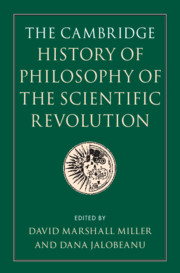Book contents
- The Cambridge History of Philosophy of the Scientific Revolution
- The Cambridge History of Philosophy of the Scientific Revolution
- Copyright page
- Contents
- Tables and Figures
- Contributors
- Preface
- Introduction The Disciplinary Revolutions of Early Modern Philosophy and Science
- Part I The Disciplines
- 1 The Uses of Ancient Philosophy
- 2 Novatores
- 3 Renaissance Aristotelianism(s)
- 4 What To Do With the Mechanical Philosophy?
- 5 The Later Sects: Cartesians, Gassendists, Leibnizians, and Newtonians
- 6 Confessionalization and Natural Philosophy
- 7 The Rise of a Public Science? Women and Natural Philosophy in the Early Modern Period
- Part II Disciplinary Activities
- Part III Problems and Controversies
- Bibliography
- Index
5 - The Later Sects: Cartesians, Gassendists, Leibnizians, and Newtonians
from Part I - The Disciplines
Published online by Cambridge University Press: 14 January 2022
- The Cambridge History of Philosophy of the Scientific Revolution
- The Cambridge History of Philosophy of the Scientific Revolution
- Copyright page
- Contents
- Tables and Figures
- Contributors
- Preface
- Introduction The Disciplinary Revolutions of Early Modern Philosophy and Science
- Part I The Disciplines
- 1 The Uses of Ancient Philosophy
- 2 Novatores
- 3 Renaissance Aristotelianism(s)
- 4 What To Do With the Mechanical Philosophy?
- 5 The Later Sects: Cartesians, Gassendists, Leibnizians, and Newtonians
- 6 Confessionalization and Natural Philosophy
- 7 The Rise of a Public Science? Women and Natural Philosophy in the Early Modern Period
- Part II Disciplinary Activities
- Part III Problems and Controversies
- Bibliography
- Index
Summary
The Scientific Revolution completely transfigured the European intellectual landscape. Old divisions disappeared, while new fault lines emerged. Ancient philosophical sects had been replaced by new schools, featuring novel masters, disciples, and methodological commitments. However, the new schools still engaged in antagonistic discourse, attacking one another along new fronts—e.g., Cartesians against Gassendists, Newtonians against Leibnizians. This chapter presents the diverse philosophical camps that arose in the later stages of the Scientific Revolution by noting a shift in the use of the term ‘sect’. While it still signified something like an Ancient philosophical school for some, it could also take on a more negative polemical meaning, intended to disparage one’s opponents. Moreover, the individuals associated with the “sects” did not all faithfully subscribe to explicit, coherent, and systematic programs. On the contrary, declaring membership of a sect was as often a signal of opposition as of allegiance to a methodology or theory. Despite calls for conciliatory research programs, sectarian attitudes did not disappear by 1750, but delineated new battle lines between the Cartesians, the Leibnizians, and the Newtonians.
Keywords
- Type
- Chapter
- Information
- Publisher: Cambridge University PressPrint publication year: 2022

